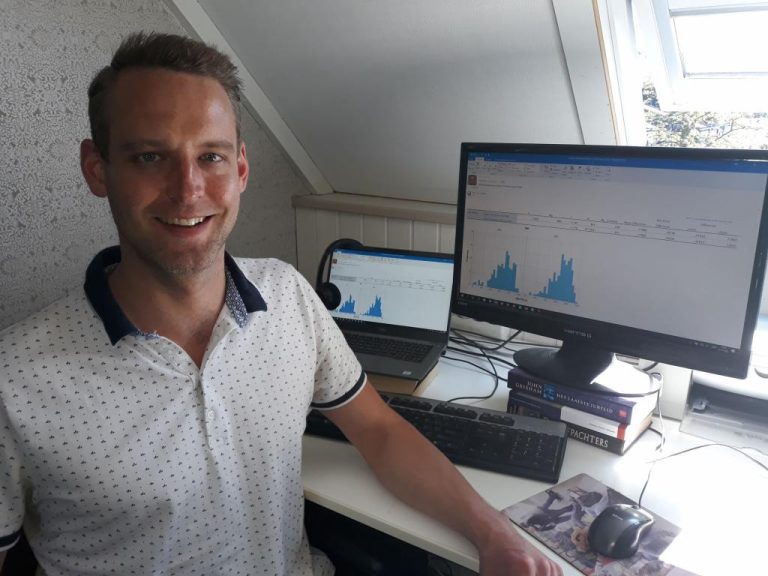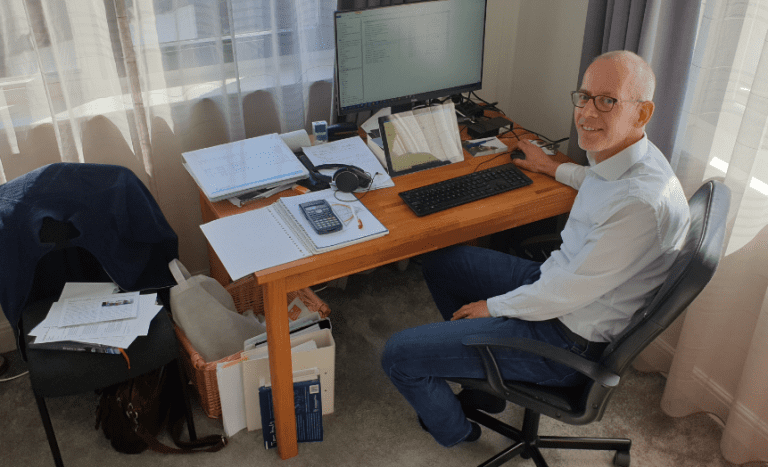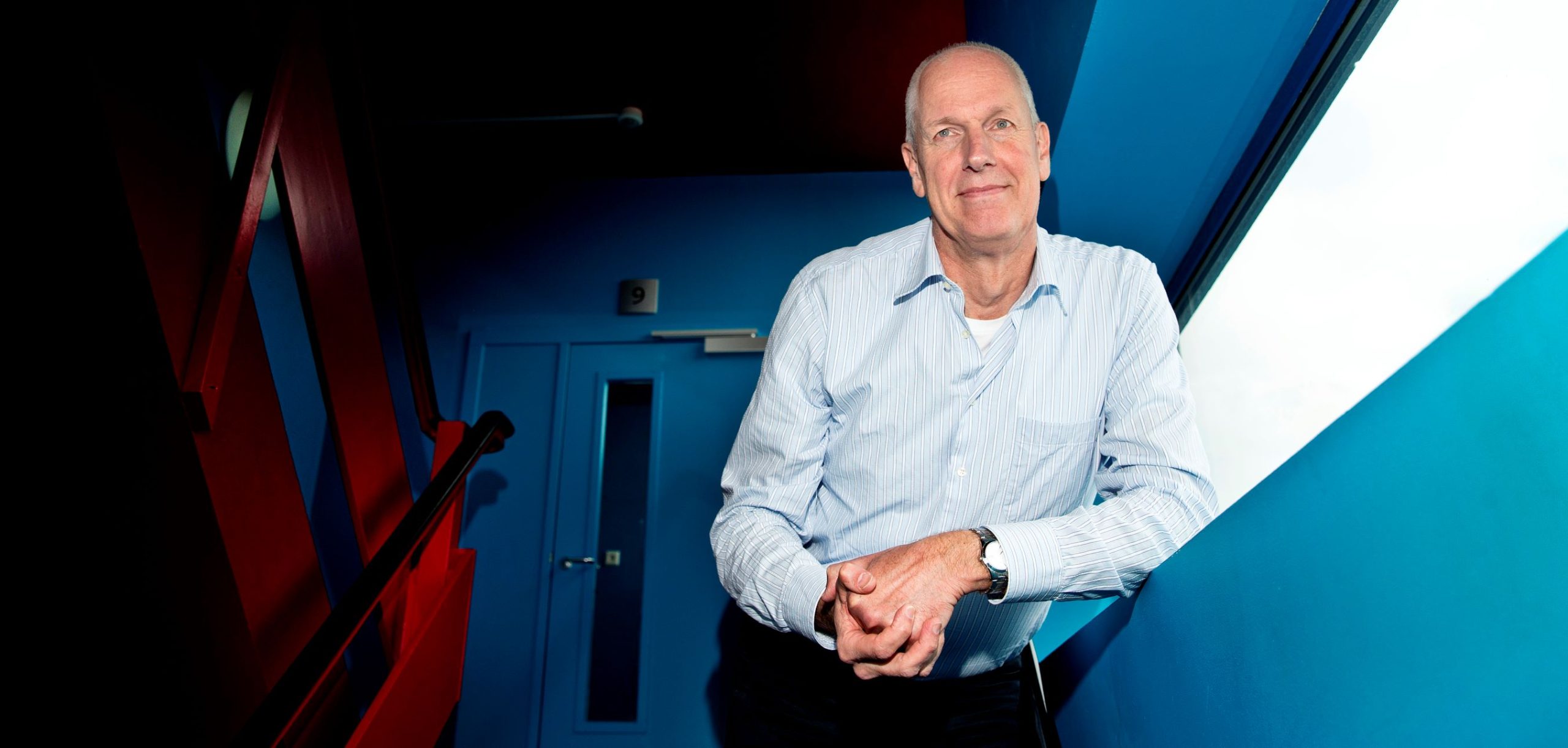The third quarter exam period is now finished. We have never had an exam period like this before. Delta asked teachers how they thought the exams went and asked them for tips.
During the exam of Ron Noomen students could ask questions through Brightspace
Name: Ron Noomen, Eng.
Faculty: Aerospace Engineering
Exam subject: Flight & Orbital Mechanics (Noomen was responsible for the Orbital Mechanics part)
Number of students: 380
Type of exam: Open book on Maple TA
“Maple TA was not new for my colleague Paul Roling who was responsible for the Flight part. It was new for me though, so I had to get used to it. Even before the coronavirus outbreak I was doing a little less digitally or online than many colleagues. It was good to have an experienced colleague like Paul around. The preparations look much more time than usual, but it saves you marking time.”
“Out of necessity, our exam was unproctored. We assumed that everyone was honest. And we opted for an open book exam to make it harder for students to confer with each other. I believe that in this method, the only things that remain are the sums in the questions. We ran some tests ahead of time to seal any cracks and to check that there would be no issues for students during the exams. Was there anything that was unclear? How can the students give their answers to the questions?”
‘I think that 75% of the exams went ahead in our Faculty’
“One disadvantage of Maple TA is that the software is less flexible than humans in checking the answers. If a student accidentally uses metres instead of kilometres, Maple TA marks it wrong. But as the teacher, you see immediately that the student has done the calculation right. So at every question we had to clearly specify that the answers had to be in kilometres or that the answers had to have three decimals after the decimal point.”
“I think that 75% of the exams went ahead in our Faculty. I think we all deserve a pat on the back with this percentage. Even if the students feel pushed, it could be far worse. It would be even worse if students would have to do their postponed exams in Q4 on top of their normal work. Doing it this way also allowed us to run the exams while the material is still fresh in their minds.”
“During ‘normal’ exams in an exam hall, students can raise their hands and ask a question. If we think that it’s useful information for the other students, we can inform all the others in the hall. We tried to have this facility now too by using Brightspace so that other students could also read our answers. We heard from one student that she preferred doing this on Zoom rather than Brightspace. This type of feedback is useful as it looks like this situation will continue for a while. The exams in Q4 will probably run more smoothly.”
- Tip: Be creative so that you can still run exams online. And check that the questions cannot be interpreted in different ways. The clearer the questions are, the better it is for everybody.

Name: Dr Trivik Verma
Faculty: Technology, Policy and Management
Exam subject: Advanced Discrete Simulation (jointly with Dr Yilin Huang)
Number of students: 69
Type of exam: Open book and open questions
“We chose to upload answers onto Brightspace instead of working with the Maple TA exam software. The students were logged into an open source web conference system called Big Blue Button so they could ask questions live. I thought it worked really well. The session was recorded so you could always check if any problems arose. Another useful aspect.”
“To prevent cheating, we did not give the students too much time for the exam. We also mostly asked open questions geared to their personal direction of study which they had to answer in essay form. For example, for certain questions we referred to an assignment that each of them had submitted earlier that year. The students could consult each other, but doing so was pretty pointless.”
‘I think that open book exams are the future’
“We put a lot of time into putting the exams together. We had to look into the most suitable software to ask questions; think about how the students could upload their answers easily; what we would do if a student’s internet connection would fail; and what word processing programme would be best. To avoid problems with the internet, we gave the students until 12:15 to upload their answers while officially the exam ended at 12:00. We also let them upload as many questions as they could while working so that there was always a back-up of their most recent answers.”
“I think that open book exams are the future. They allow you to check that the students really know the material instead of just repeating it. For most people the corona crisis is a big disadvantage, but it also offers the opportunity to think about this kind of thing.”
- Tip: Make sure that you reduce any concerns on the part of the students by giving them as much information as you can. We made slides in which we explained how to login and upload answers, about the software etc., so the students knew exactly what they had to do.

Maarten Kroesen: “During the exam, the students could ask questions on WhatsApp and by email and I answered them all.”
Name: Dr Maarten Kroesen
Faculty: Technology, Policy and Management
Exam subject: Data Analysis (partial exam)
Number of candidates: 289
Type of exam: Open book on Maple TA
“What stands out for me in this exam is the pass rate – 75% – and the average score of 6.7. Both are similar to last year when the average score was 6.6. So it does not look as if the students have either cheated or were disadvantaged by having to do the exam at home.”
“I was already familiar with Maple TA so it was not a major change for me. But it did take me three times as long to input all the questions. I used all the questions from last year so that Maple TA had as big a pool as possible from which to randomly choose questions. Each student also had random values in the calculation part.”
During the exam, the students could ask questions on WhatsApp and by email and I answered them all. What was difficult is that you can’t offer the students any technical support. There were problems at the beginning of the year with installing SPSS, the statistical computer programme. To gain access to the exam, the students not only had to do the honour pledge, but had to say if their software worked properly. If they filled in ‘no’, they could not access the exam and it would not even count as an attempt.”
‘One difficulty though, is how to arrange things so that students can exercise their right to view their exam’
“Students had two hours in which to do the exam and I heard from one of them that this was a bit too tight. I consciously chose a longer exam so that after completing the questions, the students would not have plenty of time to consult each other. I strongly believe that doing exams this way – working with as many random questions and values possible so that each student is given a unique exam – is better than online proctoring. In online proctoring the students are filmed through their webcam while doing the exam. There are some concerns about this, especially regarding privacy.”
“One difficulty though, is how to arrange things so that students can exercise their right to view their exam up to 20 days after taking it. This time if they wish to view their exam, they also have partial access to the pool of questions. This makes the exam more vulnerable to cheating, should students do resits. I am now looking into how to let students view their exam without the entire pool of questions ending up online.”
- Tip: Get the timing right. Make sure that students do not have either too much or too little time to complete the exam. You do not want to hurry them, but neither do you not want to give them too much leeway to consult each other.

Roel Schipper: “It was a lot more work to get everything ready on time. We worked through the weekends and evenings.”
Name: Dr Roel Schipper
Faculty: Civil Engineering and Geosciences
Exam subject: Construction Glass (used in building preparation), Building Physics & Façades (resit)
Number of students: 35 (Construction Glass) and 12 (Building Physics & Façades)
Type of exam: Open book on Maple TA
“At CEG, we have used an exam software called Maple TA over the last few years. It makes marking of the exams easier. Just imagine checking 330 exams by hand! In the Q3 exam period, we again used Maple TA. What was new for students, though, was that it was an open book exam this time instead of a closed book exam. This meant that there were other questions that tested understanding rather than factual knowledge.”
“It was a lot more work to get everything ready on time. We worked through the weekends and evenings to come up with new questions and to submit everything to the Exam Committee on time. By doing so, we could prove that this was a credited exam. You don’t want students to run into any problems after they have graduated and are applying for jobs, for example, because ‘corona exams’ have a dubious reputation.”
‘But we did ask students in the Façade exams if they would take a selfie against their computer screens’
“We used Maple TA to give each student an individualised but still random exam. You can’t really check for cheating, consulting each other or any other misdemeanour as we did not opt for online proctoring. In part, I want to work on the assumption that students are honest people. I know the master students personally very well. They are highly motivated so I don’t think that they would consult each other easily. But we did ask students in the Façade exams if they would take a selfie against their computer screens. This allowed us to check that they really did the exam themselves.”
“Everyone felt the urgency of having as many exams possible go ahead and to arrange things as well as we could for the students. Many people say that the coronavirus has brought on a quiet period. This is not the case in education. I miss the contact with students. I didn’t become a teacher to sit at the screen and click the mouse all day.”
- Tip: Make sure that everything is submitted to the Exam Committee in advance. This allows you to demonstrate that you have produced credited exams and the students will not face issues that their exams are ‘less valuable’ than regular exams.
Do you have a question or comment about this article?
a.m.debruijn@tudelft.nl


Comments are closed.